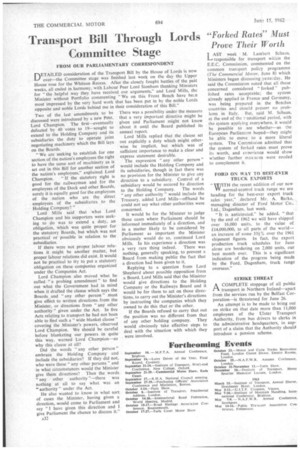Transport Bill Through Lords Committee Stage
Page 34

If you've noticed an error in this article please click here to report it so we can fix it.
FROM OUR PARLIAMENTARY CORRESPONDENT
nETAILED consideration of the Transport Bill by the House of Lords is now
over—the Committee stage was finished last week on the day the Upper House rose for the Whitsun Recess. After the closely fought battles of the pat weeks, all ended in harmony, with Labour Peer Lord Stonham thanking Ministers for "the helpful way they have received our arguments," and Lord Mills, the Minister without Portfolio commenting "We on this Front Bench have been most impressed by the very hard work that has been put in by the noble Lords opposite and noble Lords behind me in their consideration of this Bill."
Two of the last amendments to be discussed were introduced by a new Pder, Lord Champion. The first—eventually defeated by 40 votes to 19—sought to extend to the Holding Company and its subsidiaries the duty to operate joint negotiating machinery which the Bill lays on the Boards.
"We are seeking to establish for one section of the nation's employees the right to have the same sort of machinery as is set out in this Bill for another section of the nation's employees," explained Lord
Champion. "If the statutory right is good for the railwayman and for the employees of the Dock and other Boards, surely it is equally good for the employees of the nation who are the direct employees of the subsidiaries to the Holding Company?"
Lord Mills said that what Lord Champion and his supporters were seeking to do was to extend a duty, an obligation, which was quite proper for the statutory Boards, but which was not practical or possible in relation to the subsidiaries.
If there were not proper labour relations it might be another matter, but proper labour relations did exist. It would not be practical to try to put a statutory obligation on these companies organized under the Companies Act.
Lord Champion also moved what he called "a probing amendment" to find out what the Government had in mind when it drafted the clause which says the Boards and "any other person" must give effect to written directions. from the Minister, or directions from "any other authority" given under the Act. In five Acts relating to transport he had not been able to find such a "wide blanket clause" covering the Minister's powers, observed Lord Champion. We should be careful before blanketing our powers in quite this way, warned Lord Champion—so why this clause at all?
Did the words "any other person" embrace the Holding Company and include the subsidiaries? If they did not, who were these "any other persons" and in what circumstances would the Minister give them directions? Then the words "any other authority "—there was nothing at all to say what was an '` authority " under the Act.
He also wanted to know in what sort of cases the Minister, having given a direction, would come to Parliament and say "I have given this direction and I give Parliament the chance to discuss it."
A32 There was a possibility under the measure that a very important directive might be given and Parliament might not know about it until the Board published its annual report.
Lord Mills replied that the clause set out explicitly a duty which might otherwise be implicit, but which was of sufficient importance to make a clear and express statement desirable.
The expression "any other person" would include the Holding Company and its subsidiaries, though in fact there was no provision for the Minister to give any direction to a subsidiary. Control of a subsidiary would be secured by direction to the Holding Company. The words "any other authority would include the Treasury, added Lord Mills—offhand he could not say what other authorities were concerned.
It would be for the Minister to judge those cases where Parliament should be informed immediately of a direction, and in a matter likely to be considered by Parliament as important the Minister obviously would do so, continued Lord Mills. In his experience a direction was a very rare thing indeed. There was nothing, generally speaking, to prevent a Board from making public the fact that a direction had been given to it.
Replying to a question from Lord Shepherd about possible opposition from a Board, Lord Mills said that the Minister would give directions to the Holding Company or the Railways Board and it would be for them to act on those directions, to carry out the Minister's directions by instructing the companies which they owned to do this that or the other.
If the Boards refused to carry that out the position was no different from that of any other holding company. They would obviously take effective steps to deal with the situation with which they were involved.




















































































































